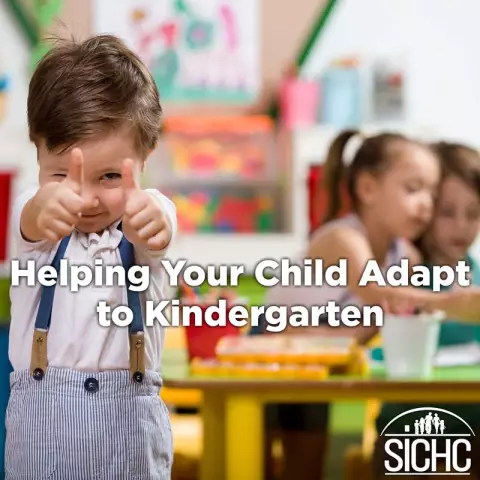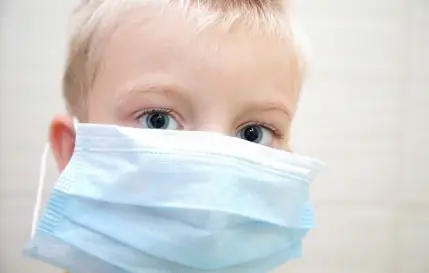- Author Rachel Wainwright wainwright@abchealthonline.com.
- Public 2023-12-15 07:39.
- Last modified 2025-11-02 20:14.
We adapt the kid to kindergarten
It seems that just recently you brought your baby from the hospital. But time flew by, and now he is going to join the first children's team in his life. How to prepare your child for kindergarten? What to teach him to facilitate the adaptation process? What to say and how to behave so that the baby will endure the changes in his life painlessly? We will try to find answers to these questions.

Source: depositphotos.com
Requirements for the child's health
According to the laws of the Russian Federation, babies entering kindergartens must be carefully examined. A special card is drawn up for each child, in which information is entered about his family, chronic diseases, the level of physical and mental development, vaccinations. The document is drawn up by the district pediatrician, he also recommends specialist doctors who should examine the baby. It:
- surgeon;
- otolaryngologist;
- optometrist;
- dentist;
- orthopedist;
- neurologist;
- dermatologist;
- endocrinologist;
- psychologist.
The conclusions of the specialists remain relevant for a long time, therefore, the examinations carried out during the year before the card was issued do not need to be repeated. For children over three years old, a visit to a speech therapist is also necessary.
In addition, the results of the following laboratory tests are entered into the card:
- general urine and blood tests;
- a blood test to determine the glucose content;
- analysis of feces for eggs of worms;
- scraping for enterobiasis.
Research should be done as close as possible to the date of transfer of the card to the kindergarten, since the results of some of them quickly become outdated. At the time of finalization of the document, a certificate is also entered into it about the absence of contacts of the child with infectious patients during the last week.
If the baby has received all routine vaccinations at the time of drawing up the map, the district pediatrician will enter information about them in the document. It happens that vaccinations are not done for medical reasons or by the decision of the parents. Information about this is also recorded in the document. The lack of vaccinations cannot become a reason for refusal to enroll in a kindergarten, but the kindergarten's medical worker must be informed about this circumstance.
Recently, the Ministry of Healthcare of the Russian Federation made a proposal to abolish the compulsory medical examination of children entering kindergartens. The meaning of the project was that many examinations children already have to take place at a certain age (for example, one or two years old), and visits to specialist doctors when drawing up a "kindergarten" card eventually turn into an empty formality (especially given the huge workload of doctors at children's clinics). It was expected that the amendment to the laws on health and education would be passed by September 1, 2015, but this did not happen. Consequently, the provision on compulsory medical examination is still in force.
There is no official list of diseases in which a child cannot be admitted to kindergarten. However, this does not mean that the peculiarities of the baby's state of health should not be taken into account when applying for a preschool institution. For children suffering from chronic diseases, there are special kindergartens in which they will be provided with individual care and metered loads. On the recommendation of the doctor, the child should be placed in an institution for the visually impaired or hearing impaired, babies with an appropriate degree of mental retardation, allergies, endocrine disorders, problems of the musculoskeletal system, etc. Parents should pay close attention to the advice of specialists not only because in a specialized kindergarten care will be optimal. Such institutions also carry out work to correct the physical disabilities of children and prepare them for school, which they cannot always competently do in a regular kindergarten and even in a family.
A common problem: the baby does not want to go to kindergarten
It happens that the documents are ready, the issues with registration are resolved and it seems that all the troubles are over, but then the parents are faced with an unexpected problem: the child categorically refuses to go to kindergarten. No persuasion helps, every morning turns into an endless hysteria. In this case, do not think that the kindergarten is bad or that your child is not yet used to it. Rather, you made a few mistakes that now need to be fixed.
First of all, the baby needs to be prepared for visiting a child care facility. He has to accept very serious changes, and this is impossible without prior awareness. In a sense, kindergarten life is the exact opposite of the child's entire experience and the instant transition to it entails serious stress. For comparison:
- at home, the child is the center of interest for adults. He is taken care of first of all, even his mistakes are discussed individually. In the kindergarten, he is only one of a whole group, and not at all the most important;
- adult family members love the baby, they are affectionate and condescending. The kindergarten workers treat all children the same, they must be obeyed, even if they do not like something;
- the daily routine, activities and food in a preschool institution can be very different from home;
- in the kindergarten you have to contact not only individual children, but also with the whole team, and this is far from always comfortable.
To avoid complete rejection of new circumstances, the child should be prepared for them in advance. Considering that in big cities, kids are enrolled in kindergartens almost from birth, we will assume that the kindergarten was chosen long before the baby reaches the optimal age to start visiting. By the way, experts consider this age to be 2.5-3 years: it is then that children endure the adaptation period most easily.

Source: depositphotos.com
3-4 months before the start of a new life, it is necessary to acquaint the child with the place of his future "work": to talk about what the children are doing in the kindergarten, how they play, have lunch, and study. It should be emphasized that the child has the opportunity to attend kindergarten because he has matured, grown wiser, and became independent. It is great if the older family members let the child know that they are proud of his successes and await further achievements. It makes sense to make the neighborhood of the kindergarten a place of constant joint walks so that the kid can see how others play on the territory.
Experts note the following patterns:
- the more complete the child has the skills of self-service, the more confident he feels in the group;
- it is easier for kids to adapt to the garden, the daily routine of which was previously adjusted, bringing it closer to what is adopted in a child care institution;
- it is easier for a child to learn how to communicate with other children and educators if he knows how to play and occupy himself on his own;
- children who have experience of communicating with their peers adapt well. It's about the simplest skills of dating, sharing toys, chatting, inviting to play, etc.
It is necessary to accustom the baby to kindergarten gradually. It is worth picking it up for several weeks before lunch or immediately after. It is very important that the child knows exactly when they will come for him, and that this rule is never violated. When bringing a baby to the garden, you must behave friendly with all children, their parents and educators: for your baby this will be a sign of reliability and safety. Good results are obtained by establishing rituals of farewell, meeting, and returning home.
One of the most important aspects of kindergarten training is parents' confidence that such education is necessary. If someone in the family doubts and sees some kind of alternative, the baby feels it and adaptation is much more difficult.
YouTube video related to the article:

Maria Kulkes Medical journalist About the author
Education: First Moscow State Medical University named after I. M. Sechenov, specialty "General Medicine".
Found a mistake in the text? Select it and press Ctrl + Enter.






